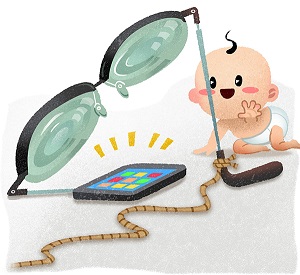


ON SUNDAY, Wang Ningli, a senior ophthalmologist from Beijing Tongren Hospital, China's most renowned ophthalmic hospital, said that "eye protection exercises are useful if you do them correctly", which aroused hot discussions online. China Daily writer Zhang Zhouxiang comments:
Hours after Wang uttered the words, the message has been forwarded on Sina weibo, China's equivalent to Twitter, with headlines such as "Eye protection exercises prevent myopia" or "Eye protection exercises slow myopia". Wang's words are clear, but some reports quoting his words are rather misleading.
Among professional ophthalmologists, there has long been a conclusion that eye protection exercises alone cannot prevent myopia, and the doctors have repeated that in one speech after another.
The most influential of them may be Li Li, chief doctor at the ophthalmic department of Beijing Children's Hospital, who, in a widespread video clip in as early as 2017, unambiguously answered that "eye protection exercises help us relax our eyes, but we have never reached the conclusion that eye exercises can help prevent or slow myopia".
Qi Ying, another ophthalmologist from Beijing Tongren Hospital, also said via micro blog that eye protection exercises have never proved successful in preventing myopia. Actually, it has long been common sense among eye doctors that nearsightedness caused by the axis oculi being lengthened is irreversible. Certain children who suffer from lens cramp can lessen it by resting their eyes, but the most effective measure is to spend more hours outdoors to get ample light.
Modern research shows that light beams are essential to the health of the eye, and children need at least two hours of outdoor activity every day in order to lower the risk of nearsightedness.
Wang is very accurate in his choice of words. Actually, after uttering the widely quoted "useful", he added that eye exercises alone cannot help and one needs multiple measures, such as outdoor activities, to prevent nearsightedness or slow its process. However, as media outlets quote only half of his sentence, that might mislead people into having a wrong attitude toward preventing myopia: They might do eye exercises without going outdoors, which in turn increases the risk of becoming nearsighted. Media outlets need to be more accurate in such reporting, so as to avoid undesired results.
 Fire brigade in Shanghai holds group wedding
Fire brigade in Shanghai holds group wedding Tourists enjoy ice sculptures in Datan Town, north China
Tourists enjoy ice sculptures in Datan Town, north China Sunset scenery of Dayan Pagoda in Xi'an
Sunset scenery of Dayan Pagoda in Xi'an Tourists have fun at scenic spot in Nanlong Town, NW China
Tourists have fun at scenic spot in Nanlong Town, NW China Harbin attracts tourists by making best use of ice in winter
Harbin attracts tourists by making best use of ice in winter In pics: FIS Alpine Ski Women's World Cup Slalom
In pics: FIS Alpine Ski Women's World Cup Slalom Black-necked cranes rest at reservoir in Lhunzhub County, Lhasa
Black-necked cranes rest at reservoir in Lhunzhub County, Lhasa China's FAST telescope will be available to foreign scientists in April
China's FAST telescope will be available to foreign scientists in April "She power" plays indispensable role in poverty alleviation
"She power" plays indispensable role in poverty alleviation Top 10 world news events of People's Daily in 2020
Top 10 world news events of People's Daily in 2020 Top 10 China news events of People's Daily in 2020
Top 10 China news events of People's Daily in 2020 Top 10 media buzzwords of 2020
Top 10 media buzzwords of 2020 Year-ender:10 major tourism stories of 2020
Year-ender:10 major tourism stories of 2020 No interference in Venezuelan issues
No interference in Venezuelan issues
 Biz prepares for trade spat
Biz prepares for trade spat
 Broadcasting Continent
Broadcasting Continent Australia wins Chinese CEOs as US loses
Australia wins Chinese CEOs as US loses